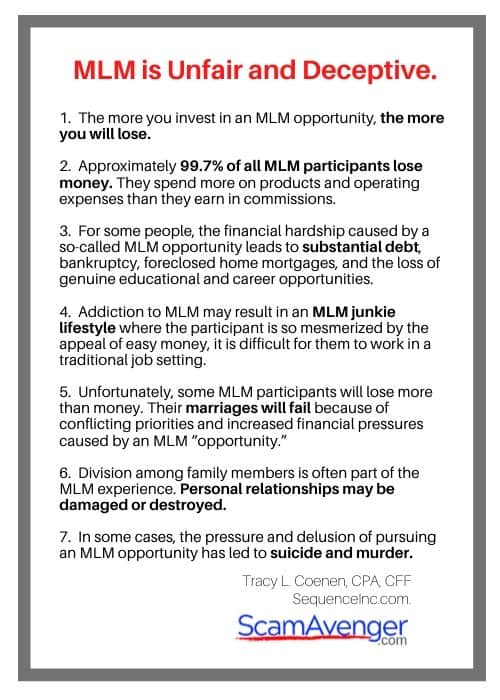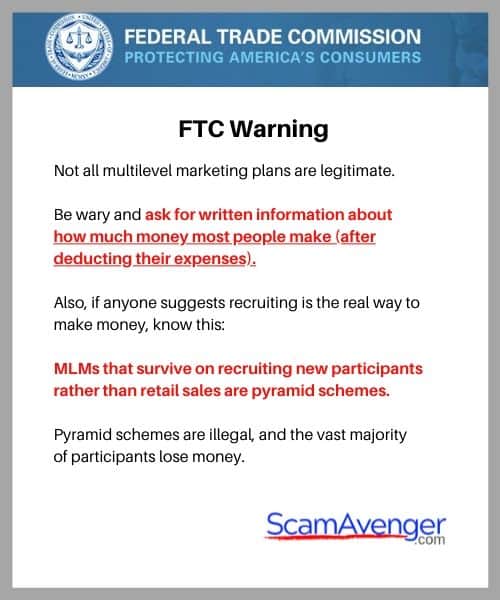Has a friend or relative pitched a direct sales opportunity to you that looks like a pyramid scheme? Here’s how to tell the difference.
“Direct sales” is not a pyramid scheme. “Direct sales” is a general term that defines any business that markets directly to consumers. However, some pyramid schemes claim to be a direct marketing company.
In this article you’ll discover the Federal Trade Commission’s litmus test for determining if an opportunity is a legitimate direct sales offer or a pyramid scheme.
Is Direct Sales a Pyramid Scheme?
To better understand how direct sales is not a pyramid scheme , we must first look more closely at them both.
, we must first look more closely at them both.
And to be fair to you, we must also look at multi-level marketing, an industry that might be confused with direct sales and pyramid schemes.

What is “Direct Sales?”
Most people probably hear the term “direct sales” from someone who is trying to recruit them into multi-level marketing (MLM).
MLM companies describe themselves as a direct sales company to avoid the stigma associated with MLM. And, some pyramid schemes claim to be direct sales companies too.
“Direct sales” is a generic umbrella term that can describe any business that sells directly to the end consumer. Initially, this meant door-to-door salespeople.
Though rarely seen today, in the past a person selling vacuum cleaners, kitchen knives, encyclopedias or Fuller brushes door-to-door was doing direct sales.
Meet the Direct Selling Association.
The businesses that fielded these door-to-door salespeople were direct sales companies and they were usually members of the Direct Selling Association (DSA ).
).
For most of the last 100 years, until about 1970, the DSA was the industry representative for companies that sold door-to-door.
However, in recent decades door-to-door sales diminished and the original direct sales companies faded away or evolved into MLMs.
Today, the DSA still has a few members that are genuine direct sales companies, however, most of the members are MLMs. The DSA now represents the MLM industry and lobbies for laws that favor MLMs.
What is an MLM?
An MLM recruits a sales force with the promise or implication of an opportunity to make money, perhaps even become rich, by promoting the company’s products.
In other words, MLMs sell a dream.
Wikipedia describes multi-level marketing as network marketing, referral marketing and “pyramid selling.” No wonder there is so much confusion.
The tell-tale sign of a multi-level company is its multi-level compensation plan.
If you have been offered an opportunity to join a company that has a multi-level compensation plan, it’s a multi-level company regardless what the person trying to recruit you might claim.
The purpose of the multi-level compensation plan is to convince a prospective recruit that it is possible to make a lot of money with the opportunity.
A few members at the top of the plan might earn extraordinary incomes.
However, less than 1% of all members ever make it beyond the lowest levels. At the lowest levels members typically spend more on the so-called opportunity than they make.

Is MLM Direct Sales?
In most jurisdictions around the world, there is no legal definition of “direct sales.” Because MLMs sell directly to the end-user, technically it is direct sales.
However, it may not be a clear cut as it seems.
While some MLMs have robust retails sales to people outside of the company or salesforce, some MLMs earn most of their revenue from their salespeople.
The salespeople are the customers.
These MLMs are dependent of recruiting, because new recruits the company would have no customers. In other words, they are dependent on recruitment.
These MLMs that are dependent on recruitment share some similarities with pyramid schemes.
Pyramid schemes are dependent on recruitment too.
What is a Pyramid Scheme?
A pyramid scheme does not create value, or sell a product, nor does it offer a genuine business opportunity.
However, some pyramid schemes conceal their nature by offering overly expensive products or services and claiming to be an MLM or a direct sales company.
Pyramid schemes are unsustainable. They reward a few members at the top of the sale force at the expense of everyone else in the organization.
Members must pay to join and usually must continue to pay each month to continue to be active members.
These members then recruit new members who pay to join and continue pay each month.
Members are rewarded for each new member they bring into the organization but most of the money is paid to higher levels in the organization.
Ultimately, the members at the top of the organization make a percentage of every dollar paid into the organization below them.
Recruitment is achieved by promising prospects the opportunity to make a lot of money, live a wealthy lifestyle and achieve their dreams, whatever they might be.
Like MLMs, pyramid schemes are dependent on recruitment. Without recruitment, the organization collapses.
And, like pyramid schemes, MLMs recruit by selling a dream of opportunity.
Most pyramid schemes earn revenue solely on recruitment fees and rarely sell a product or service. Here is where MLMs differ from pyramid schemes.
Legitimate MLMs have robust retail sales and earn most of their revenue from retails sales of genuine products or services.
Because pyramid schemes are dependent on recruitment they cannot be sustained, but collapse when there are no more people to recruit.

Similarities Between MLMs and Pyramid Schemes.
Pyramid schemes and MLMs share the following traits.
- Both promise opportunity.
- Both sell a dream of a better life.
- Both require participants to pay for the privilege of working for the company and usually require monthly payments to continue to participate. These payments might be cash. Typically, the payment is concealed as a requirement to buy expensive products each month.
- The first people to join have an advantage over everyone who joins later.
- Both are winner takes all games. A few people at the top of the organization make a lot of money because everyone else in the organization loses money.
- Both are dependent on recruitment.
- In both business models, most participants lose money.
The Traits of a Traditional Direct Sales Company.
Traditional direct sales companies do NOT have a multilevel compensation plan.
Traditional direct sales companies do NOT require a salesperson to pay for the privilege of making the company money or to buy products each month.
Company revenues come from retail sales to the public, NOT from recruitment or sales to members of the salesforce.
A salesperson can earn a respectable, full-time income from retail sales alone and is never encouraged to recruit people into the business.
A salesperson territory is protected. No other salespeople can operate in that area.
Is it a Legitimate Opportunity?
Pyramid schemes have an awful reputation and they are illegal in most countries. No legit company would ever claim to be a pyramid scheme.
However, a pyramid scheme might claim to be a direct marketing company.
I suspect when a person asks if “direct sales” is a pyramid scheme it is because someone is trying to recruit them into an “opportunity.”
Recruiting family and friends is a clear indication of an MLM or a pyramid scheme. Recruitment is the lifeblood of those two business models.
A more revealing question to ask might be, is the business you have been offered a legitimate opportunity?
How to Tell if a Direct Sales Opportunity is Legit.
If a company is openly trying to recruit you, it’s not a traditional direct sales company. It’s either an MLM or a pyramid scheme.
At that point, you really don’t need more information because, either way, you’ll lose money if you get involved.
However, if you want to dig deeper, find out if the company has a multilevel compensation plan. That still may not determine if it’s a pyramid scheme or an MLM, but it will show that the deck is stacked against you.
Finally, see if you are encouraged recruit people into the business and build a “team” to make money.
And, must you pay the company for a starter kit and buy products each month to qualify for bonuses?
These tricks reveal that the company is making a lot of money from its sales-force, not from retail sales.

The FTC’s Warning About MLMs and Pyramid Schemes.
Former chairwoman of the Federal Trade Commission, Edith Ramirez, openly chastised MLM members of the Direct Selling Association.
Chairwoman Ramirez told DSA members if they were going to promise people opportunity, they must also provide proof the opportunity is real.
In the wake of her comments, instead of offering proof, MLMs toned down their promise of opportunity, at least on their websites and places where they could be held accountable.
To help consumers determine if an opportunity is a pyramid scheme, the FTC issued a warning which I have paraphrased below. You can read the entire original statement at FTC.gov .
.
Here’s what the FTC says:
- Not all multilevel marketing plans are legitimate.
- Ask for written statement showing how much money most people make (after deducting expenses).
- If anyone suggests recruiting is the way to make money it may be a pyramid. An MLM that depends on recruiting instead of retail sales is probably a pyramid scheme.
- Pyramid schemes are illegal and cause the majority of participants lose money.
The Last Word on Direct Sales and Pyramid Schemes.
Joining a pyramid scheme is never a good idea, unless you enjoy prison décor and like to lose money.
Traditional “direct sales” is mostly a thing of the past. In the age of the internet, going door to door or chasing after customers is a ridiculous way to earn a living.
The MLM business model is just as silly. Beware of friends and family promising opportunity.
Today, people shop online. They buy the things they want, when they want, and usually for the best price too. MLMs and direct sales can’t give them that.
If you are interested in building an online business, this is your most affordable option.

